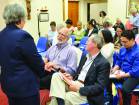

Some 2,000 years ago, people gathered to hear the words of Jesus. At the New York Catholic Bible Summit, hundreds gathered to hear and learn about the Word in Scripture. The times may have changed, but people are just as hungry for the messages of the Bible.
A diverse crowd of 600 people of all ages gathered June 22 on a beautiful summer Saturday to learn more about faith and Scripture at the Bible Summit, sponsored by the
archdiocesan Catechetical Office and the American Bible Society. The summit’s theme was “Preach the Gospel to the Whole of Creation” (Mk 16:15).
The crowd, including many parishioners from across the archdiocese and some from beyond its borders, was welcomed by Sister Joan Curtin, C.N.D., director of the Catechetical Office, and Father James Puchy, managing director of national and strategic ministries for the American Bible Society.
Cardinal Dolan, in his homily at the opening Mass, which he celebrated, set a tone for the summit by focusing on Jesus’ words in the Gospel from Matthew: “Look at the birds: they do not plant seeds, gather a harvest and put it in barns; yet your Father in heaven takes care of them! Aren’t you worth much more than birds? Can any of you live a bit longer by worrying about it?”
The cardinal said, “If we need it, an example of how practical, how helpful, how useful God’s word in the Bible is in our day-to-day lives, we have to look no further than this morning’s beautiful Gospel.”
“It’s not that Jesus is saying, I don’t want you to be concerned about these problems in life,” explained the cardinal, rather it is that he doesn’t “want you to worry about them because worry goes against hope.”
He added, “St. Thomas Aquinas, the great theologian, reminds us that worry is really a sin against the virtue of hope.”
During the keynote address in English, Father James Martin, S.J., editor at large of America magazine, discussed Jesus in Scripture and as the living Word. “All of us want to learn how to meet God in our prayer lives,” he said.
He described prayer as “a conversation that happens in the midst of a personal relationship with God.”
He told those in the packed auditorium that there is no right or wrong way to pray. He gave examples of different kinds of prayers, including the sacraments, an examination of conscience, nature prayer, rote prayers and centering prayers, among others.
He discussed in detail two different ways to pray with Scripture, “Lectio Divina” and “Ignatian Contemplation.”
Father Martin said, “Lectio divina helps us enter into the Scripture in a very profound way.” There are four questions one should ask when reading Scripture using lectio divina: What does the text say? What does the text say to me? What do I want to say to God about the text? and What difference will this text make in my life?
“Prayer should change us,” he said.
When discussing Ignatian Contemplation, Father Martin said one should use all the senses to enter into the Scripture. In this form of prayer, he said, “You try to picture yourself with as much vividness as possible.” He explained that God can work through our imaginations, and sometimes when we are present in the moment, God can reveal things to us.
The keynote in Spanish was delivered by Archbishop Jesus Ruben Salazar Gomez of Bogota, Colombia.
Workshops covered topics including: “Eavesdropping on Jesus,” by Sister Carol Perry, S.U.; “Reading Ancient Parables in a Modern Metropolis,” by Michael Peppard; and in Spanish: “Los Papas y La Nueva Evangelizacion,” by Father Claudio M. Burgaleta, S.J.; and La Crisis de los dos Evangelios en la Carta a los Galatas,” by Father Dempsey Rosales Acosta.
In a workshop called “Christ Sent Me to Preach the Gospel: Insights from Paul,” by Sister Maria Pascuzzi, S.S.J., the presentation examined St. Paul and how his practices can be used in the new evangelization.
In the filled chapel of Cathedral High School, Sister Maria said, “Evangelizing and proclaiming the Gospel in word and deed is truly at the heart of Catholic identity.” She noted that many Catholics are turned off by the word “evangelization,” but, like St. Paul, they should embrace the Gospel and not be embarrassed to share it.
She said that by reading the Letters of St. Paul, one can see that “even though Paul understood (evangelization) was his single mission in life, it doesn’t mean preaching came easy.”
During her workshop, she noted the importance of evangelization in the life of a healthy Church. Like St. Paul, “we have to become unashamed of the Gospel,” in order to evangelize, Sister Maria said.
Lazaro and Maria Valdes, a married couple from St. Joseph’s parish in Astoria, Queens, attended the summit because “we wanted to participate and learn to strengthen our Catholic knowledge, our biblical knowledge,” Valdes said.
Translating for his wife, who spoke Spanish, he said, “God sends messages through his children. I want to find out what message God is trying to tell me here at the summit.”
Valdes further noted that he and his wife invited two of their family members—his sister-in-law and niece, and said, “One of the things I want to do is have more knowledge on how to evangelize.”
Another participant, Chris Fanelli, is a catechist at St. Ignatius Loyola parish in Manhattan. “This helps us get tools to help present Scripture to the children,” she said.
“This Bible Summit really gives us an opportunity to study and explore Scripture,” she said.